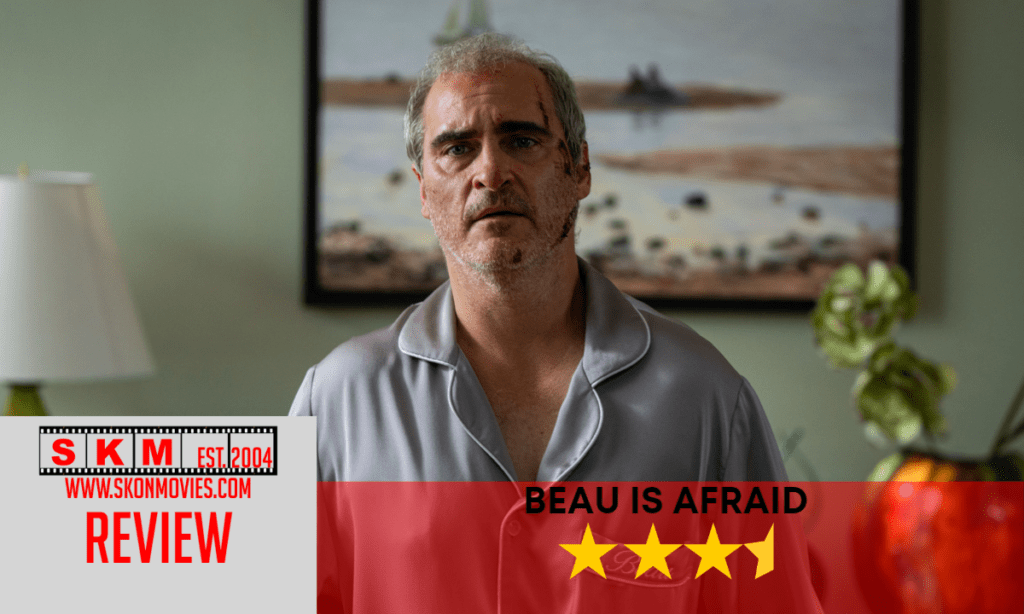Content Advisory: Abuse, Self-injurious behavior, Suicide, Graphic sexuality or pornography
An anxiety-ridden man tries to make it home for his mother’s funeral in Beau is Afraid. Beau Wassermann (Joaquin Phoenix) is a middle-aged man who lives on his own, often afraid to venture out into the world around him. Beau regularly visits his therapist (Stephen McKinley Henderson) to talk about his anxieties, often involving his mother, Mona (Patti LuPone), who is the head of the successful conglomerate empire, “MW Industries.” The day after missing his flight for his yearly visit with his mother, Beau finds out that Mona died in a freak accident, and he is told by her lawyer Dr. Cohen (Richard Kind) that she cannot be buried until he returns home for the funeral. However, as Beau tries to make his way home, he encounters many obstacles.
Beau is Afraid Synopsis
Beau is Afraid is the latest film from writer/director Ari Aster (Hereditary, Midsommar). While Aster’s first two features were decidedly in the horror genre, Beau is Afraid is more of a nightmarish dark comedy featuring horror and surreal fantasy elements. Beau’s odyssey to make it home for his mother’s funeral takes many detours. This includes being hit by a car and nursed back to health by overly accommodating Grace (Amy Ryan) and Roger (Nathan Lane) and their less accommodating teenage daughter Toni (Kylie Rogers), encountering a theatre troupe in the middle of the woods and reuniting with his teenage crush Elaine Bray (Parker Posey). The film also features flashbacks of a young Beau (Armen Nahapetian) and how much control his mother Mona (Zoe Lister-Jones) had over his life growing up, leading to severe anxiety.
My Thoughts on Beau Is Afraid
Running at just under three hours in length, Beau is Afraid is the result of Ari Aster being given complete creative freedom, after the success of his first two features, to create a film that he had been developing for a decade, an expansion of Aster’s 2011 short titled Beau. It is an uneven film, which I am not sure truly justifies being as long as it is. However, Beau is Afraid still leaves quite a bit to discuss.
Arguably, the best section of Beau is Afraid, the film’s first act, which is a perfectly accurate visualization of what it is like for someone who suffers from anxiety. The film is told entirely from Beau’s point of view, and he perceives that everyone outside is out to get him in one way or another. This leads to the inciting incident of Beau is Afraid, where Beau’s luggage and keys mysteriously disappear while he is preparing to leave to visit his mother, setting in motion the living nightmare that he will live over the coming days.
The plot of Beau is Afraid is divided into approximately five chapters, which sees Beau finding himself in a different situation. Arguably in the longer yet somewhat visually special sections in the film, see Beau as imagining that he is the protagonist of a play performed in the woods. This includes surreal animation to show the passage of time as Beau becomes a bearded old man looking for the family he lost. This scene ultimately acts as little more than an aside, though I’m not sure I would argue for its exclusion from the film, despite being a heavy contributor to the three-hour runtime.
The final act of Beau of Afraid will likely make or break the film for those watching it. Without giving too much away, we learn the full extent of the gaslighting Beau experienced from this mother. There is also a very unexpected reveal in the attic of Beau’s mother’s house, which I am still trying to wrap my head around. Because most of the film is told from Beau’s perspective, it is pretty tricky to describe what in the plot is real and what manifests Beau’s anxiety. However, I’m pretty sure this reveal is probably the latter.
Given some of the dark places the film goes, particularly towards the end, I’m not sure that Beau is Afraid is a film I recommend to everyone. However, Ari Aster is developing into quite an auteur, and it will be interesting to see how his future projects turn out.



